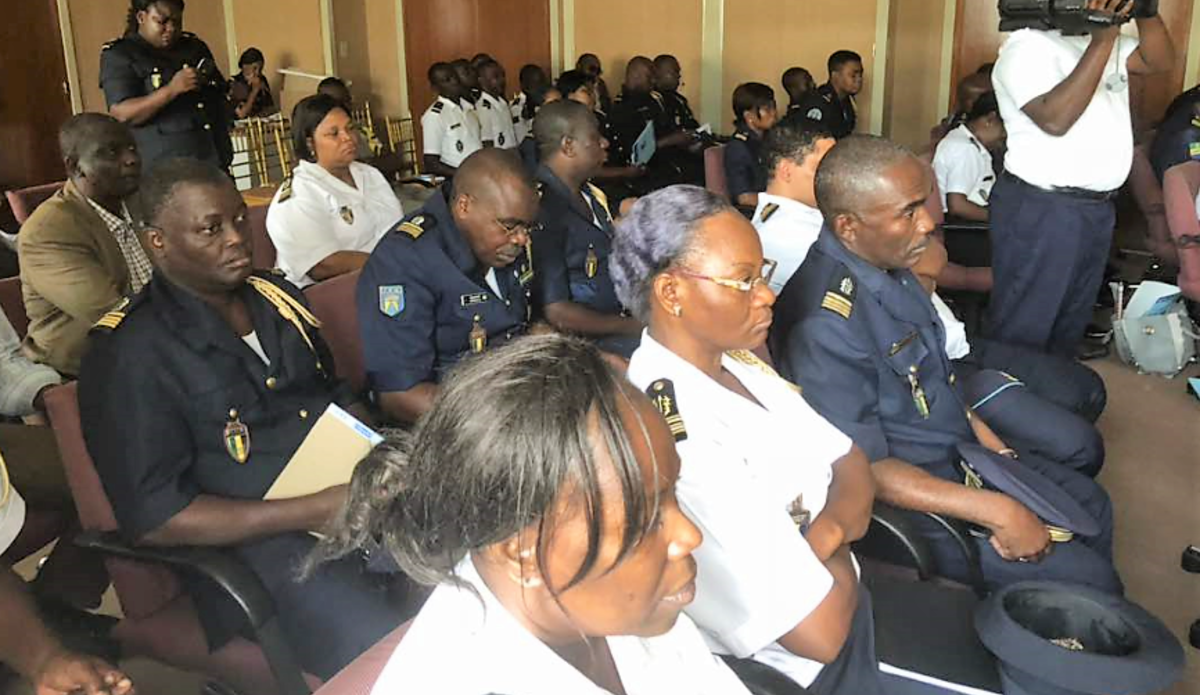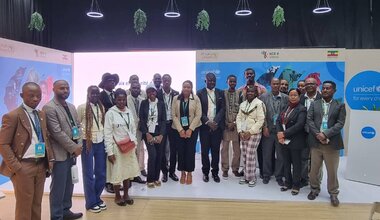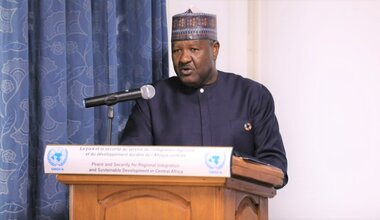Gabonese police: organised crime at the centre of a workshop supported by UNOCA
The training workshop of the National Police Forces (FPN) of Gabon on "organized crime" was officially opened on Monday 16 April 2018 at the Ministry of Interior, headquarters of the FPN Command, Libreville. The ceremony took place in the presence of Mrs. Judith Koumba Pemba Mombo, Secretary General of the Ministry, Mrs. Yvonne Cécile Foh, Ambassador and Director of Consular Administration at the Ministry of Foreign Affairs, several Generals, Senior and Junior Officers.
n his introductory remarks, Mr. Norbert N. Ouendji, Head of the Strategic Communication and Public Information Unit of UNOCA, highlighted the context and challenges of this session jointly organized by the Government of Gabon and UNOCA. “Strengthening the capacity of national institutions in charge of prevention of violence and maintenance of law and order is an essential component of UNOCA's mandate," he noted, adding that this issue is also a priority for the UN Secretary-General's Special Representative for Central Africa and Head of UNOCA, François Lénouncy Fall.
Implementation of the regional counter-terrorism strategy
Mr. Norbert N. Ouendji, stressed that UNOCA assists "States in the sub-region in their efforts to combat and prevent armed violence and terrorism; poaching and illicit trafficking of wildlife species; drug and narcotics trafficking; proliferation of small arms and light weapons; etc." In that connection, he noted that UNOCA had facilitated, inter alia, the elaboration of the regional strategy to combat terrorism and the proliferation of small arms and light weapons in Central Africa. This document was adopted in November 2015 in Libreville at the 41st meeting of the United Nations Standing Advisory Committee on Security Questions in Central Africa (UNSAC) - for which UNOCA provides secretariat services. It was endorsed by the Council of Ministers of the Peace and Security Council of Central Africa (COPAX) at its 5th Ordinary Session held from 3 to 4 March 2018 in Libreville, the capital of Gabon.
"UNOCA will continue to work closely with the Economic Community of Central African States (ECCAS) to support, when necessary, the implementation of this regional strategy... which was inspired by the 2006 United Nations Global Counter-Terrorism Strategy," said Norbert N. Ouendji, by recalling a commitment by the Special Representative.
Returning to the importance of the workshop, the Head of the Strategic Communication and Public Information Unit of UNOCA stressed that UNOCA's support for this activity is in line with Goal 16 of the SDGs (Sustainable Development Goals), which "aims to strengthen, within the framework of international cooperation, national institutions at all levels to prevent violence and combat terrorism and crime, particularly in developing countries". In this spirit, Mr. Norbert N. Ouendji reiterated his appreciation for the fruitful cooperation between the Gabon National Police Force and UNOCA and for the dynamic collaboration with Commissioner Irene Gaga, Senior Police Adviser of UNOCA. These Forces are working with her with dedication on the question of maintenance of peace and security as well as training of managers, which are core priorities for both institutions.
Facing the "future sectors" of crime...
Major General Yves Marcel Mapangou Moussadji, Second Chief Commander of the National Police Forces, thanked UNOCA for its "invaluable support to organize this meeting". He indicated that this meeting will help "to paint a picture of the crime of tomorrow [and] to highlight the risks resulting from globalization", in particular "identity-based violence, illegal border-crossing[...], the new vulnerabilities linked to the hyper-connection of the world, the interconnection of criminal actors...". He also welcomed the inclusion in the programme of the workshop of discussions and analyses on what he called the "sectors of the future" of crime: uncontrollable financial flows, environmental destruction and the misuse of technological revolutions, including robotics, nanotechnologies or biotechnologies. He expressed the wish that, at the end of the work, the participants (approximately twenty officers) would be better equipped to help the government to tackle them.
"We are convinced that this training will contribute to strengthening the effectiveness of the Gabonese police forces to respond to the transnational and cross-border security challenges facing these forces," added the Head of the UNOCA Strategic Communication and Public Information Unit.
 UN
UN





